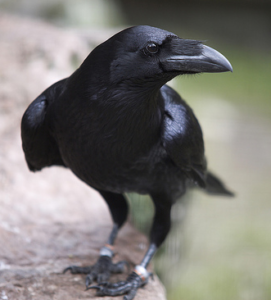Edgar Allan Poe (1809-1849), American author, critic, editor and poet, is well known for his short stories in the mystery and macabre genre. One of the poems that he is well known for is ‘The Raven’, first published in 1845, four years before his death in the Evening Mirror. The Raven is a poem about the a mysterious raven that visits a man who has just lost the love of his life, a lady name Lenore and for each question, he poses, the answer that the raven gives is “Nevermore” (meaning never again). Poe refers to the raven as an ominous bird of yore. Now, I must admit that I enjoyed reading the poem, despite its melancholy tone and sense of hopelessness undertone, because of its literary composition as a trochaic octameter (8 trochaic feet per line, with alternating stressed and unstressed syllables) and especially because of its references to Biblical words (Seraphim, Balm of Gilead (Jeremiah 8:22), and Aidenn (for Eden i.e., Paradise). However, I would be careful to not call one of God’s creation, ominous, for after God created the fowls of the air (the raven being one of them), he called it good (Genesis 1:21) and it was ravens that brought food to God’s servant, Elijah, to sustain him by the Cherith brook, before the Jordan river (1 Kings 17:1-6).
So there is something we can learn from the raven, as we can from any of the animals mentioned in the Bible.
The Raven was the first creature, after the flood of Noah, to be sent on a mission, most likely for the same reason, he sends out a dove subsequently in a weeks time, which is to determine the readiness of the earth for the inhabitants of the ark. However, the Bible records that the raven flew to and fro (vacillating) until the waters were dried up from the earth, meaning that it did not return back to Noah. Though, the Bible does not explicitly state the reason for this behavior of the raven that was sent from the ark of Noah, the most plausible explanation is that the raven, an unclean bird (Leviticus 11:15), would have settled to gorge on the dead flesh from the flood, satisfying its appetite, possibly settling on the mountain tops that were seen (Genesis 8:5), instead of fulfilling its mission and returning to Noah. It was to “nevermore” (never again) return to Noah.
Points to ponder:
They that are after the flesh (like the raven that Noah sent out) do mind (commune with) the things of the flesh, which is death, but they that are after the Spirit the things of the Spirit, which is life and peace (Romans 8:5-6). Let us not be like that of the raven, vacillating, nevermore!
Genesis 8:5-7 (KJV)
5 And the waters decreased continually until the tenth month: in the tenth month, on the first day of the month, were the tops of the mountains seen.
6 And it came to pass at the end of forty days, that Noah opened the window of the ark which he had made:
7 And he sent forth a raven, which went forth to and fro, until the waters were dried up from off the earth.
Romans 8:5-6 (KJV)
5 For they that are after the flesh do mind the things of the flesh; but they that are after the Spirit the things of the Spirit.
6 For to be carnally minded is death; but to be spiritually minded is life and peace.


